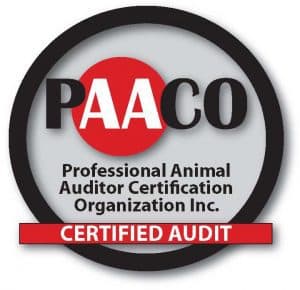WASHINGTON, D.C. – After a several month review process, the National Chicken Council’s (NCC) broiler and broiler breeder welfare guidelines have been certified by the Professional Animal Auditor Certification Organization (PAACO), a leading authority on animal welfare auditing who provides high quality training and certification credentials for auditors and audits.
“Consumers want to be sure that all animals being raised for food are treated with respect and are properly cared for during their lives,” said Dr. Ashley Peterson, NCC senior vice president of scientific and regulatory affairs. “The people, families, and companies involved in raising broilers – chickens raised for meat – share the public’s concern. With this certification, consumers and customers can feel confident that when buying and eating chicken, the birds were well-cared for and treated humanely.”
Peterson continued, “Our approach to the well-being of the birds is focused on objective measures and welfare outcomes throughout the birds’ entire lives, using the latest science and data and by carefully observing the chickens’ behavior.”
The NCC broiler guidelines were last updated in January 2017 and the NCC broiler breeder guidelines were last updated in June 2017, but this is the first time in history they have been certified by an independent audit certification organization.
“Our mission at PAACO is to promote animal welfare through auditor training and audit  certification,” said Executive Director Collette Kaster. “We are very pleased with the inclusion of many of the review panel and PAACO’s recommendations into this revision, and as a result the guidelines are stronger than before and will facilitate more rigorous audits in the future.”
certification,” said Executive Director Collette Kaster. “We are very pleased with the inclusion of many of the review panel and PAACO’s recommendations into this revision, and as a result the guidelines are stronger than before and will facilitate more rigorous audits in the future.”
The U.S. national broiler flock is incredibly healthy as mortality and condemnation rates for broilers, the most sensitive indicators of the health and well-being of any flock, are at historical lows. Building on that success, the 2018 update of the NCC Animal Welfare Guidelines has more substance than ever before and incorporates new parameters to improve chicken welfare, including:
- Increased focus on bird behavior, objective measures and welfare outcomes;
- Increasing recordkeeping and corrective action requirements both in the hatchery and on the farm;
- Increasing oversight of chick welfare at the hatchery;
- Adding time requirements for euthanasia of birds unfit for transport;
- New parameters on catching requirements;
- Improved consistencies between the NCC broiler and breeder guidelines for ease of auditing;
- Adding a major non-conformance to the broiler breeder guidelines; and
- Adding specifics on broiler breeder monitoring by an auditor.
Also according to the guidelines, birds must have enough space to express normal behaviors such as dust bathing, preening, eating, drinking, etc. The number of birds in a chicken house (also known as “stocking density”) is based on a few factors, including the overall size of the barn, the size of the equipment in the house, and the target market weight of the birds – and is measured to ensure that chickens when fully grown have space to access fresh water and feed throughout their life.
NCC in 1999 developed the NCC Animal Welfare Guidelines and Audit Checklist which have been widely adopted as a baseline by chicken farmers and processors to ensure all U.S. chickens are being properly cared for and treated humanely. Periodically revised, the guidelines cover every phase of a chicken’s life and offer the most up-to-date, science-based recommendations for the proper treatment and humane care of broiler chickens.
###



